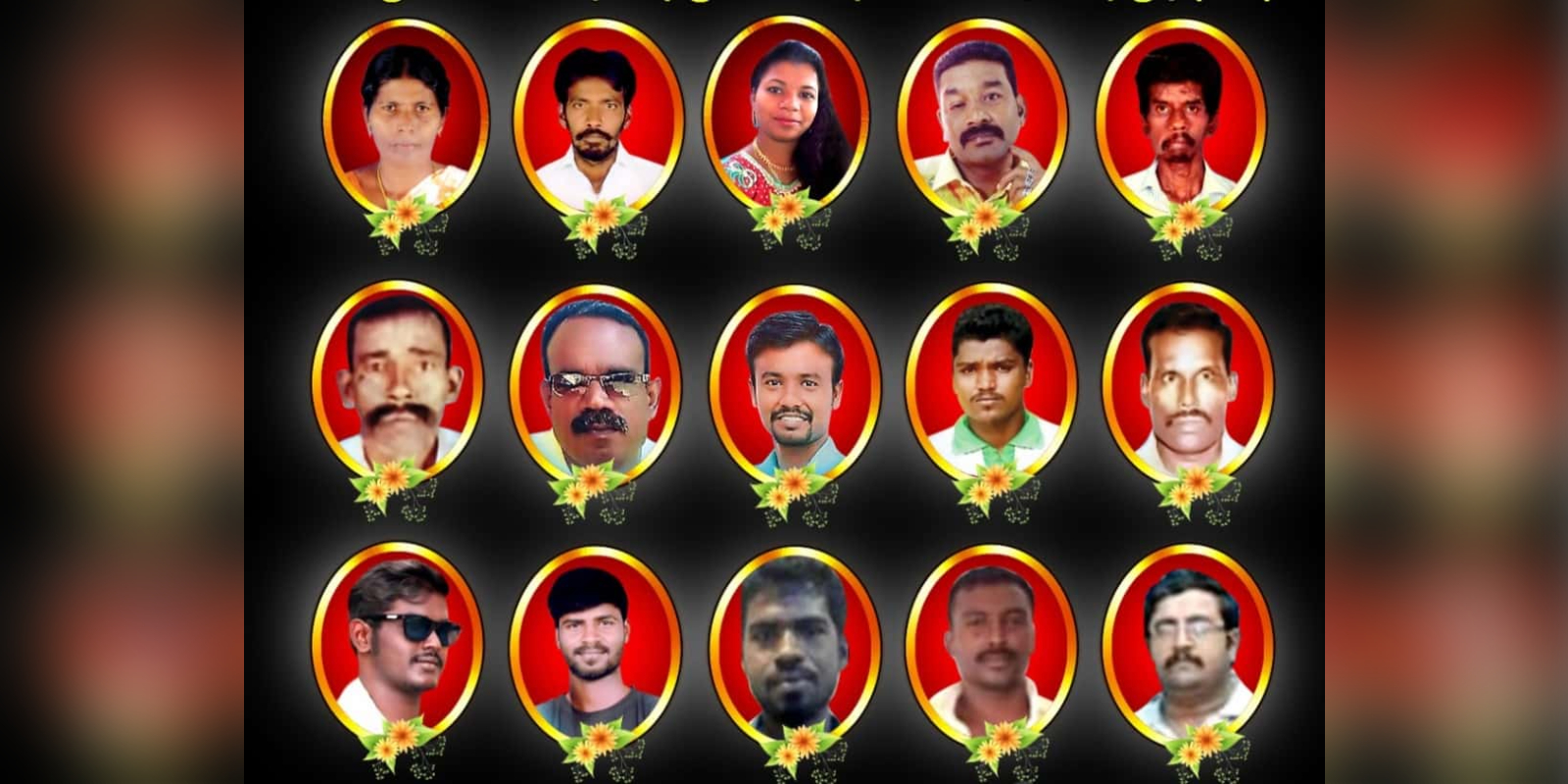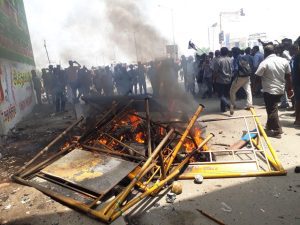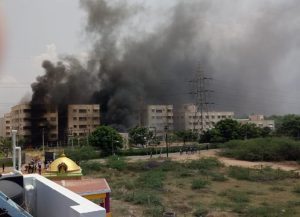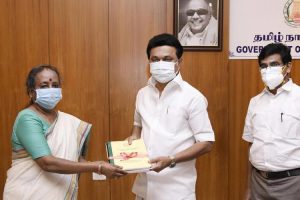Chief Minister MK Stalin received the 3,000-page report on one of Tamil Nadu’s worst human rights violations and police excesses on 18 May.
Published Aug 25, 2022 | 12:05 AM ⚊ Updated Aug 25, 2022 | 12:06 AM

People killed in the 2018 Thoothukudi police firing, as remembered by the Anti-Sterlite People’s Movement. (Supplied)
The Justice Aruna Jagadeesan Commission of Inquiry, which was constituted by the previous AIADMK government in Tamil Nadu to probe the 2018 Thoothukudi police firing case — in which 14 people protesting against Vedanta’s Sterlite Copper Smelting Plant over environmental and health concerns were shot dead by the cops — has in its report named top police officials and bureaucrats whose actions or inactions led to the “dastardly act”.
The Frontline published key findings of the commission, which has recommended that the Tamil Nadu government take criminal and departmental action against the erring officials.
Based on the findings of the commission that were put out by the magazine, political parties and human rights activists have demanded that the current DMK government release the full report and take stringent action against all the officials who have been named in it.
The 3,000-page report on one of Tamil Nadu’s worst human rights violations and police excesses was submitted to Chief Minister MK Stalin on 18 May.
The port town of Thoothukudi — formerly Tuticorin — witnessed unprecedented violence on 22 May, 2018, which was the 100th day of the anti-Sterlite protests. The police personnel were outnumbered by the protestors and the agitation ended up in violence and arson.
The police opened fire to “control the situation” and “in self-defence”, killing 13 protestors — including an 18-year-old Snowlin Jackson — on the spot. Another protestor succumbed to bullet injuries after a few days of hospitalisation.
Four years after that bloody episode, justice is still elusive for the families of the deceased protestors, with no serious action taken against any top official for the horrific incident. However, the report by the probe panel has now given them a glimmer of hope.
According to Frontline, the commission “meticulously reconstructed the incident” to understand the issue in its entirety.
The panel is said to have found no evidence to corroborate the then government’s claim that the police opened fire as they could not control the crowd.

The aftermath of the violence on the 100th day of the anti-Sterlite protest that resulted in a police firing. (Supplied)
The commission’s report apparently pointed out that those who took part in the rally on that fateful day were “unarmed and indulged only in stone-pelting”. There was no “imminent threat to the life and limb of the policemen”, it noted.
The report also found that the police fired on “fleeing protestors” using “long-range weapons” without “even aiming below their waist and knees”. They did so by shooting “from their hideouts” at the protestors who were “far away from them”.
It further noted that the police did not follow the Police Standing Orders (PSO), or “Dos and Don’ts” that needs to be followed during such circumstances.
“There were no deterrent acts, such as warnings, use of teargas or water cannons, lathi-charge, or warning shots in the air, as mandated by the PSO,” the commission noted.
In order to underline the police’s “extrajudicial adventures”, the commission reportedly cited the example of police constable and “ace-shooter” Sudalaikannu, who was the only cop who could be found “willingly and exuberantly” everywhere across the town on 22 May, 2018, carrying a long-range Self-Loading Rifle, through which he fired 17 rounds.
Very importantly, the commission is said to have named top police officials in the report, as they were found to have “certainly exceeded the limit”.
They include the then Inspector General of Police (South Zone) Shailesh Kumar Yadav (now ADGP, Police Welfare); Deputy Inspector General of Police (Tirunelveli Range) Kapil Kumar C Saratkar (now an Additional Commissioner of Police, Chennai city); Superintendent of Police (Thoothukudi) P Mahendran (now Deputy Commissioner (Admn), Chennai); and Deputy SP (Thoothukudi) Lingathirumaran.
The report also named three inspectors, two sub-inspectors, a head constable, and seven constables.
“The commission blamed the IGP for failing to evolve ‘fitting strategies’ even after receiving intelligence inputs that strongly suggested the possibility of a breach of peace on 22 May,” Ilangovan Rajasekharan of the Frontline wrote.
“After the initial shooting inside the collectorate, which claimed five lives, the IG ordered the opening of fire outside the premises on ‘mere apprehensions of violence’ against the police, it states,” he added.
There had apparently been a demonstrable failure on the part of the police higher-ups to organise the police personnel properly and to issue commands effectively.
It was also noted that there was a total lack of coordination between the police officials in the hierarchy.
The commission is said to have urged the government to take action against these officials “for their acts of commission and omission departmentally without prejudice to launching criminal action”.

The 100th day of the anti-Sterlite protest turned violent. Miscreants indulged in arson and vandalism. (Supplied)
The report further singled out the then Thoothukudi district collector N Venkatesh, who is now with the National Fisheries Development Board in Hyderabad.
The report, according to Frontline, highlighted his “abdication of responsibility, gross negligence, and ill-conceived decisions”.
Instead of being at the district headquarters in Thoothukudi, especially considering how the 100th-day protest was held outside the collector’s office, he was at Kovilpatti, which is around 100 km away from the town when it came under siege. The commission has asked the government to “take departmental action” against him.
“It appeared that he was indifferent from the beginning. He did not even preside over the peace committee meeting prior to 22 May. Had he taken it seriously and not left it to Sub Collector MS Prasanth to handle, the issue would not have ‘ended in fiasco’,” the Frontline story read.
His role in the “haphazard implementation” of prohibitory orders just prior to the protest was also highlighted by the commission.
After the damning content of the report came to light, Tamil Nadu Law Minister S Reghupathy said in a statement that the report had been sent to the concerned departments so they can take appropriate action against the officials named in it. The report was also sent to legal advisors for their consideration.

The probe panel submitted its interim report to Chief Minister MK Stalin on 14 May, 2021. (Supplied)
Once necessary action is taken by the concerned departments, the final report of the commission, along with an action-taken report, would be tabled in the Tamil Nadu Assembly, the minister said.
He added that based on the interim report of the commission, the government had withdrawn 38 cases filed against the public in connection with the incident.
The government has also extended financial aid to the tune of ₹1 lakh to 93 individuals who were arrested during the protests and suffered mental distress.
Reacting to the report’s findings, senior AIADMK leader D Jayakumar asked how the report was “leaked”, and demanded the arrest of those responsible for it.
Accusing the DMK government of “failing to protect government secrets”, Jayakumar alleged that the chief minister was enacting a “drama” to deflect the people’s attention from its “atrocities”.
The AIADMK, it may be noted, faced huge backlash over the way in which its government handled the anti-Sterlite protests in 2018.
The police firing episode remains one of the biggest blots on former Tamil Nadu chief minister Edappadi K Palaniswami’s governance track record.
The demand for justice for the families of the victims of the police firing grew louder once again after the findings of the inquiry commission were reported.
Lawyer and activist Jimraj Milton told South First that the government should release the full report of the Inquiry Commission. “The government must table the report in the Assembly after accepting its recommendations,” he said.
Explaining the need to do so, he said: “Though the inquiry commission has named several senior officials, the CBI — which is also probing the case — hasn’t named any senior official in its charge sheet. Once the government tables the report, it can be used by the state government in the court to seek further investigation by the CBI to expose the roles played by the officers.”
Milton, who has filed PILs and provided legal support to anti-Sterlite protestors, said that though they are okay with 90 percent of what the inquiry commission has said in its report, the panel has not looked into the alleged collusion between Sterlite and the government officials.
“This collusion can be found only if there is a criminal investigation. That is why the government needs to accept the report and seek further investigation by CBI in the matter,” he explained.
Similarly, the Anti-Sterlite People’s Movement also petitioned the collector, demanding that the full report be made public immediately.
Apart from seeking immediate removal of all the officials named in the report from their current positions and their arrest, the citizens’ group also sought action against EPS, then chief secretary Girija Vaidyanathan and Anil Agarwal, owner of Sterlite, which belongs to the Vedanta Group.
Political parties like the CPI(M) and the CPI also demanded that the government release the full report.
“It is better that the state government officially releases the full report to the public and brings the people who are guilty to justice,” CPI(M) state secretary K Balakrishnan said.
The CBI probe into the police firing — as ordered by the Madras High Court — found that “acts of the police in opening fire against the protestors were not predetermined, and the same was done only as a last resort to prevent any further untoward incidents though the death of 13 protestors was very unfortunate”.
Though the CBI pointed out that there were glaring lapses on the part of senior revenue officials, it only recommended departmental action against them.
Meanwhile, only one police inspector was named in its charge sheet, which on the other hand named 101 protestors.
The CBI also blamed the government machinery for the lack of coordination that resulted in complete chaos on 22 May, 2018.
Several activists in the state are unhappy with the CBI charge sheet, as they believed the probe agency had not looked into or named senior officials whose acts of commission and omission led to the disaster that was the Thoothukudi police firing.
